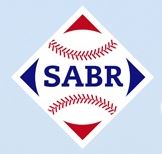The Baseball Reliquary is the Mardi Gras of our national pastime – a free-spirited celebration of the human side of baseball’s history and heritage.
Reliquary (rel′ə kwer′ē)
Noun- a container or shrine in which sacred relics are kept and displayed for veneration
How do I describe the Baseball Reliquary? It’s really not a place. While its “home” is in the state of California (Pasadena), the Reliquary really resides more in the heart of its founders, honorees and members – who take joy in celebrating the character and characters of our national pastime. The Reliquary leads that joyful (often irreverent) celebration through its Shrine of the Eternals, its collection of historic artifacts, and its traveling exhibitions.
The Shrine of the Eternals is the Reliquary’s best-known element and its honorees include (among others) a one-armed major league outfielder, a pitcher who once threw a no-hitter while high on LSD, a team owner who sent a midget to the plate, a man in a chicken suit, a member of Major League Baseball’s 3,000-hit club, a manager who won eight World Championships, a noted surgeon, a labor leader, more than one best-selling author, a statistical wizard and even the sports editor of the Daily Worker (American Communist Party newspaper).The honorees are each unique in their role in – and contributions to – the national pastime, but they all share the distinction of having made a significant impact on the game.
The Baseball Reliquary’s Collection of what BBRT would term “art-ifacts”is as diverse as its Shrine honorees. The collection includes (but is “oh-so not limited” to) the Walter O’Malley Tortilla, the Roger Bresnahan Potato, the Eddie Gaedel Jock Strap, a Babe Ruth cigar, a Mother Teresa autographed baseball (a whole case actually), a heat-twisted 45-rpm record from the White Sox’ ill-fated Disco Demolition Night, and a piece of flesh from Abner Doubleday’s inner thigh.
The Baseball Reliquary’s Traveling Exhibits have included baseball art, photography and literature; and have covered such varied topics as Latino baseball history, baseball in foreign policy, baseball literature and even the self-defining “Lasordapalooza.”
So, back to the question, “How would I describe the Baseball Reliquary?” If I had to put it in 25 words or less, “The Baseball Reliquary is the Mardi Gras of our national pastime – a free-spirited celebration of the human side of baseball’s history and heritage.”
Do I have your attention? If so, continue on for the full (and FUN) story of the Baseball Reliquary – and how you can become one of its card-carrying members.
The Baseball Reliquary
In its own official words, The Baseball Reliquary (established in 1996) is a non-profit organization “dedicated to fostering an appreciation of American art and culture through the context of baseball history and to exploring the national pastime’s unparalleled creative possibilities.”
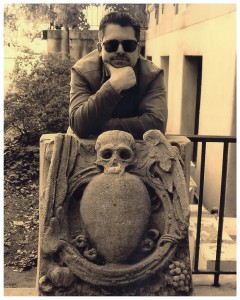
The Baseball Reliquary’s founder and Executive Director Terry Cannon says establishing this unique tribute to the character and characters of the game was both “a calling and a challenge.”
The Reliquary was born out of its Executive Director Terry Cannon’s passion for history, art, culture and baseball – and it brings them all together in its approach to our national pastime.
“Two of the great passions in my life have been baseball and art,” Cannon told BBRT in a recent interview, “and I always thought it would be interesting to create an organization that would marry these two seemingly disparate, but actually very inter-connected mediums.”
That explains the Reliquary’s ties to the world of art and culture, but what about the touch of wry irreverence that seems to be part of the Reliquary’s basic essence? Multiple MLB team owner Bill Veeck, Jr. (unknowingly) played a role in that development.
Detroit-born (1953), Cannon’s passion for baseball began as a boy and his “feel” for the game was shaped when, at age nine, he read “Veeck – as in Wreck” – an account of the baseball life of one of the game’s true rebels and rabble-rousers. Like most of the Shrine of the Eternals’ honorees (and Veeck is one), Veeck combined personality and principles, an anti-establishment point of view and a commitment to innovation, as he strove to enliven the game. Cannon recalls the Veeck saga fondly.
“Reading ‘Veeck’ at a young age had a profound effect on me, not only in terms of my thoughts on baseball, but also in the way I viewed the world around me,” Cannon said. “I’ve always had a sort of anti-establishment perspective and enjoy getting under the skin of the stuffed shirts whenever the opportunity avails itself, just as Veeck did. That first chapter in Veeck’s book, which covers the Eddie Gaedel caper – A Can of Beer, a Slice of Cake – and Thou, Eddie Gaedel – is, in my opinion, one of the finest pieces ever written on baseball. It set me on a path which resulted in the creation of the Baseball Reliquary. It’s all in that one chapter – the history, the showmanship, the humor, the exploration of the national pastime’s creative possibilities, the critique of the establishment – and these traits would all become hallmarks of the Reliquary.”
Cannon, who refers to the task of establishing the Reliquary as “a calling and a challenge,” was well suited for the undertaking. He had previously (in the 1970s) founded the low-budget, non-profit Pasadena Film Forum (and served as its executive director for many years), so he was used to combining the methodical work of starting a new organization from the ground up with the more free-wheeling approach of the art world. His subsequent work in the publishing field and libraries also proved beneficial.
“I currently work part-time as a library assistant for the Allendale Branch of the Pasadena Public Library,” he said. “It fits very nicely with the Baseball Reliquary, since most of our exhibitions and programs are free of charge and held in public libraries. That’s been kind of a niche for the Reliquary, since we don’t have a brick-and-mortar home.”
From this perspective, commitment and experience sprang The Baseball Reliquary – which continues its “work” with support from memberships, donations and grants from various arts and cultural organizations (particularly the Los Angeles County Arts Commission).
The Baseball Reliquary “Shrine of the Eternals”
The Shrine of the Eternals has often been characterized as the “Fans’ Hall of Fame” and there is truth in that observation. The Shrine is an answer to baseball’s need for a place to go beyond statistics and on-field performance and recognize the human side of the game – to honor baseball’s finest stories and most storied characters. Whereas Cooperstown is a statistics-driven election process conducted by a select few voters, voting for electees to the Shrine of the Eternals is open to all Baseball Reliquary members (Go to http://www.baseballreliquary.org/membership.htm to find out how easy it is to join). The formal criteria for election: “The distinctiveness of play (good or bad); the uniqueness of character and personality; and the imprint that the individual has made on the baseball landscape. Electees, both on and off the diamond, shall have been responsible for developing baseball in one or more of the following ways: through athletic and/or business achievements; in terms of its larger cultural and sociological impact as a mass entertainment; and as an arena for the human imagination.” (BBRT is especially drawn to that final criterion.) While each electee is unique, they all have one thing in common, their contributions to baseball were in some way game-shapers or game-changers.
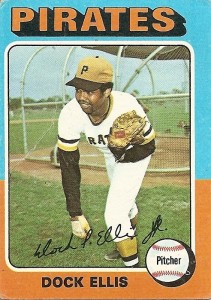
Dock Ellis, first “Shrine of the Eternals” inductee, described as “iconoclast, risk-taker … who, time and time again, put principle over profit.”
Based on this criteria, the very first inductee to the Shrine of the Eternals (in 1999) was Pittsburgh Pirates’ pitcher Dock Ellis – who is remembered for wearing hair curlers on the field during pregame warmups, once setting out to hit the entire Cincinnati Reds line-up, pitching a no-hitter while on LSD and being the National League starting pitcher in the 1971 All Star Game. There was, of course, more to Ellis’ contributions to the game – and to the recognition bestowed by the Baseball Reliquary. Ellis was known as one of baseball’s fiercest competitors, most courageous advocates for racial equality and a vocal spokesperson for players’ rights. At Ellis’ induction, Cannon read from a letter sent to Ellis by Jackie Robinson, commending his contributions, acknowledging the cost of stepping forward and urging Ellis to continue his advocacy for racial fairness in baseball. Robinson wrote, “I want you to know how much I appreciate your courage and honesty. In my opinion, progress for today’s players will only come from this kind of dedication. Try not to be left alone. Try to get more players to understand and you will find great support. You have made a real contribution. I surely hope your great ability continues. That ability will determine the success of your dedication and honesty.”
Cannon is particularly proud of the Reliquary membership’s first choice for induction. In Cannon’s words, “I think, as far as inductees go, our membership made a very strong statement by choosing Dock Ellis to be in the very first class of inductees. Here was someone who was an iconoclast, a risk-taker, a person who, time and time again, put principle over profit. He was what the civil rights activist Bayard Rustin liked to call an ‘angelic troublemaker.’ Dock set the tone for the many anti-establishment figures who would later find a home in the Shrine of the Eternals.”
Joining Ellis in the first class of electees to the “Shrine of the Eternals” were long-time, outstanding major league outfielder Curt Flood (whose challenge to MLB’s Reserve Clause began a dramatic shift in baseball’s balance of economic power) and multiple MLB team owner Bill Veeck, Jr. (considered one of the national pastime’s most creative, boundary-stretching promoters).
Over the years, plenty of unique and influential characters (three annually) have joined the Eternals, including such truly big-league personalities as the politically rebellious Bill “Spaceman” Lee; the entertaining Mark “The Bird” Fidrych; the irreverent Jim “Bull Dog” Bouton; and the unpredictable Jimmy Piersall. In 2003, the Eternals welcomed Ila Borders (the first woman to receive a college baseball scholarship, win a men’s college game and win a men’s regular-season professional game). Steve Dalkowski – thought to be the fastest and wildest hurler ever (and the inspiration for “Nuke Laloosh” in the movie Bull Durham) was enshrined in 2009. This year, the Eternals added Eddie “The King” Feigner (softball’s greatest showman and perhaps the finest fast-pitch hurler ever – nearly 10,000 exhibition wins and 140,000 strikeouts while heading the King and His Court, a four-man fast-pitch squad).
Shrine of the Eternals inductees also include such game-changing individuals as Dr. Frank Jobe (who pioneered the Tommy John surgery); labor leader Marvin Miller; statistical wizard Bill James; and Lester Rodney (the first sports editor of the Daily Worker, the American Communist Party newspaper).
You’ll also find star players who made contributions to baseball’s character on and off the field like Yogi Berra, Roberto Clemente, and Satchel Paige.
You can find the full list of 45 inductees at the end of this article, but I urge you to visit and explore the Baseball Reliquary’s website http://www.baseballreliquary.org. You’ll find the stories behind all the inductees there. And, while you are at it, consider a membership ($25.00 annually) – it’ll give you, as a fan, a voice in next year’s election.
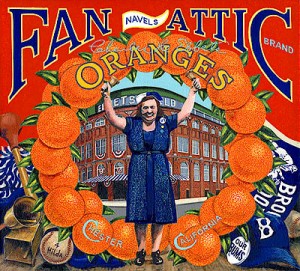
“Fan Attic Brand” by Ben Sakoguchi, from the artist’s Orange Crate Label Series: The Unauthorized History of Baseball. (Part of The Baseball Reliquary’s permanent collection.)
Since 2001, The Baseball Reliquary also has annually honored a baseball fan with its Hilda Award – named for Hilda Chester (aka “Howling Hilda”), probably baseball’s best known and most devoted fan. Hilda rooted and hooted for her beloved Brooklyn Dodgers for more than 30 years (beginning in the 1920s). Her raspy voice carried far – as did the frying pans and iron ladles and, eventually, the cowbell she used to punctuate her cheers and criticisms, after health issues led her doctor to suggest she tone it down a bit. (The annual Hilda Award is an old cowbell encased in a Plexiglas box with an engraved inscription.)
With BBRT based in Minnesota, I was proud see a Saint Paulite among the Hilda Award recipients. Retired university professor Dr. Seth Hawkins, known as “Doctor Fan” among friends and colleagues, was recognized in 2002. Among his accomplishments, Hawkins has been in the ballpark for every 3,000th hit recorded in the major leagues since 1959.
In 2002, The Baseball Reliquary added the Tony Salin Memorial Award (in honor of the late baseball historian and researcher). The award, Cannon noted, recognizes “individuals for their contributions to preserving baseball history and for bringing attention to the stories and legacies of the game’s forgotten heroes, who are largely unknown to the general public.” Among its past recipients are Richard Beverage, a former president of the Society for American Baseball Research (SABR) and best-selling author Paul Dickson (The Dickson Baseball Dictionary; Bill Veeck: Baseball’s Greatest Maverick; The Joy of Keeping Score; and more).
The Collection
While the annual Shrine of the Eternals election and awards ceremony are the Reliquary’s most often publicized activities, there is a lot more going on within the organization. It all started in 1996, with the still-growing collection of baseball artifacts as its foundation. Developing and displaying that “traveling museum of baseball wonderments and oddities” has been a labor of love for Terry Cannon, his wife Mary (who serves as the Baseball Reliquary’s Artistic Director), and Archivist and Historian Albert Kilchesty. Like the Eternals, each of the now nearly 100 items in the collection is unique in its own way, yet they share a commonality in their relevance to baseball. They are part fact/part fiction (with a very blurry line in between), but each tells a chapter in baseball’s story. Kilchesty has explained the philosophy behind the collection this way: “The Baseball Hall of Fame uses artifacts to trigger the imagination. The Reliquary uses the imagination to trigger the artifacts.” Both, BBRT believes, enrich the history of the game.
Let’s consider just a few of the Reliquary’s popular artifacts and their relevance.
A tortilla bearing former Dodger owner Walter O’Malley’s image provides a base from which to reflect upon the initially contentious relationship between O’Malley and the Mexican-American community that was displaced to make room for the Dodgers’ stadium in Chavez Ravine. Then there is the box of Mother Teresa “autographed” baseballs, a poke at the FBI’s celebrity autograph and memorabilia fraud bust of 2000. The Ty Cobb “Humanitarian of the Year Award,” a silver-plated cup presented to Cobb for his contributions toward the building of a modern hospital for his hometown, spurs discussion of Cobb’s reputation as one of the meanest, most vindictive ballplayers ever. As noted in the text explaining its place in the collection “…it is believed that this was the only award ever bestowed on Ty Cobb for ‘humanitarianism,’ as the quality or state of being humane was a trait rarely associated with ‘The Georgia Peach’.”
Cannon described the Baseball Reliquary’s collection as consisting of “objects through which we have discovered entirely new ways of looking at, and interpreting, the history and folklore of our national pastime. Due to our collections policy and our creative and frequently unusual approaches to the documentation and interpretation of baseball history, the Reliquary may be the only baseball museum for which no category yet exists.”
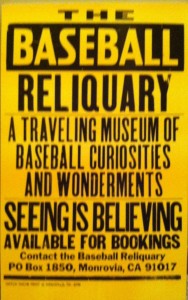 “The Baseball Reliquary functions very much in the spirit of the world’s earliest 17th and 18th century museums,” Cannon said, “Magical places which displayed curiosities beside scientific specimens and works of art, and where the curators were almost like conjurers, working under the assumption that truth is a many-faceted gem.”
“The Baseball Reliquary functions very much in the spirit of the world’s earliest 17th and 18th century museums,” Cannon said, “Magical places which displayed curiosities beside scientific specimens and works of art, and where the curators were almost like conjurers, working under the assumption that truth is a many-faceted gem.”
He added that The Baseball Reliquary has also become a sort of final resting place for artifacts that other organizations have discarded or do not consider appropriate for exhibition purposes.
“The flesh from the inner left thigh of Abner Doubleday, for example, came from the National Baseball Hall of Fame, whose early curators felt that the public would find it repulsive,” Cannon explained. “On the contrary, it has become a signature piece of the Reliquary collection, and it is met with jubilation wherever it is exhibited.”
Traveling Exhibitions
A you can see, The Baseball Reliquary is dedicated to celebrating the national pastime – and it does that not just with a wink and a “truthful grin,” but also with cultural exhibitions that document baseball’s place in history and its contribution to culture (at home and abroad). The Reliquary has, through the years, sponsored exhibits and projects touching on such topics as baseball in literature (Baseball by the Books); baseball card art (Cardboard Fetish); Latino Baseball history (The Latino Baseball History Project); and baseball and American patriotism and foreign policy (Patriotic Pitch: The Empire of Baseball).
Cannon is particularly proud of Another Trip in Baseball’s Time Machine: Photography at the Field of Dreams, which just concluded a two-month run at the Pasadena Central Library.
“Another Trip in Baseball’s Time Machine: Photography at the Field of Dreams was an excellent example of the Reliquary’s curatorial philosophy,” he said. “We asked a group of historians, authors, artists, photo archivists, etc. to submit their favorite baseball photograph along with a description of why the image had such personal meaning to them. What makes a particular image resonate so personally and profoundly with someone is the hook to the exhibition, and it is what engages the viewer and provides new insights into the pastime.
“Many people who viewed the exhibit – baseball fans and non-fans alike– said it provided them with a new perspective on the game’s history and its relationship to the American experience,” Cannon added. “That’s what we try to achieve with our exhibitions – they may not always hit the mark, but this one was about as good as it gets.”
So, what does the future hold for the Baseball Reliquary?
“Over the last year, we have been preoccupied with finding a home for the Reliquary’s voluminous research materials,” Cannon said. “We have, over the years, compiled an impressive reference collection, which includes Paul Dickson’s research materials related to his Bill Veeck book (Bill Veeck: Baseball’s Greatest Maverick) and to the history of scorekeeping. We are currently negotiating with a college in Southern California to serve as the repository for the research collection. “
Cannon said he hopes to have news on this front in the next couple of months, adding that “The Reliquary will continue operating as a peripatetic museum, as we always have, but the reference materials would have a home where they could be accessed by students, scholars, and the general public.”
There’s a look at The Baseball Reliquary from BBRT’s point of view. If you are a baseball fan (and if you are reading this blog, I assume you are), I urge you to take a look at what the Reliquary has to offer from your own point of view. That is exactly what Terry Cannon and The Baseball Reliquary’s officers, board and membership are all about. I urge you to visit the Reliquary’s web site at http://www.baseballreliquary.org – poke through the links (especially those that take you to the annual Shrine of the Eternals induction information). I guarantee you will be (as the Reliquary aims for) “amazed, enlightened and informed.” While you are at the site, check out the membership information and consider becoming a card carrying member of the Baseball Reliquary (my membership card has a place of prominence in my wallet).
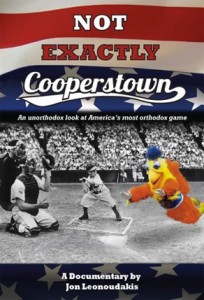 If you want to learn more, you also can purchase the video (DVD) documentary about the Baseball Reliquary, “Not Exactly Cooperstown,” described by filmmaker Jon Leonoudakis as “an unorthodox look at America’s most orthodox game,” from the Baseball Reliquary “store” or at http://notexactycooperstown.com
If you want to learn more, you also can purchase the video (DVD) documentary about the Baseball Reliquary, “Not Exactly Cooperstown,” described by filmmaker Jon Leonoudakis as “an unorthodox look at America’s most orthodox game,” from the Baseball Reliquary “store” or at http://notexactycooperstown.com
Editor’s Note: Inductees to The Shrine of the Eternals since elections began in 1999 include, in alphabetical order: Jim Abbott, Dick Allen, Roger Angell, Emmett Ashford, Moe Berg, Yogi Berra, Ila Borders, Jim Bouton, Jim Brosnan, Bill Buckner, Roberto Clemente, Steve Dalkowski, Rod Dedeaux, Jim Eisenreich, Dock Ellis, Eddie Feigner, Mark Fidrych, Curt Flood, Ted Giannoulas, Josh Gibson, Jim “Mudcat” Grant, Pete Gray, William “Dummy” Hoy, Shoeless Joe Jackson, Bill James, Dr. Frank Jobe, Bill “Spaceman” Lee, Roger Maris, Marvin Miller, Minnie Minoso, Manny Mota, Lefty O’Doul, Buck O’Neil, Satchel Paige, Jimmy Piersall, Pam Postema, Jackie Robinson, Lester Rodney, Pete Rose, Casey Stengel, Luis Tiant, Fernando Valenzuela, Bill Veeck, Jr., Maury Wills, and Kenichi Zenimura.

